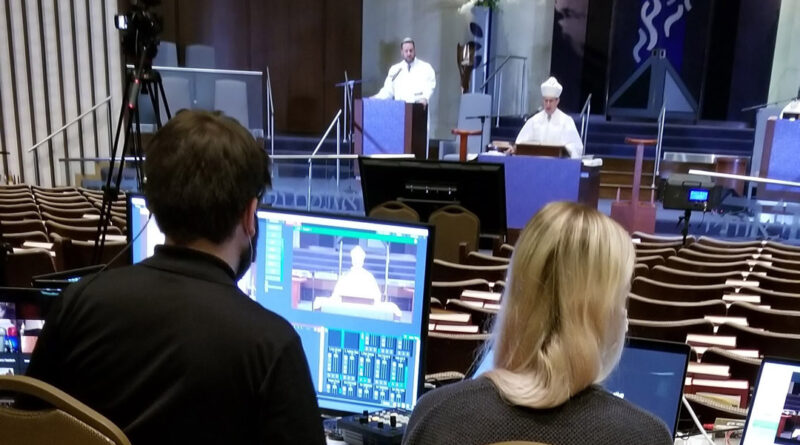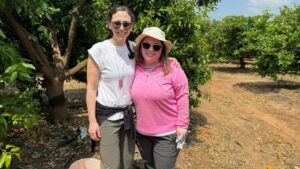This is the second installment of a three-part series on the pandemic’s impact on Jewish congregational life. (See Also: How Synagogues Can Reinvent Themselves in the Post-COVID Era)
Contrary to conventional wisdom, the streaming of religious services in American synagogue life did not begin with the onset of the pandemic.
For instance, Har Sinai Congregation, then in Owings Mills, started streaming its Shabbat and High Holiday services free via its website nearly eight years ago. Rabbi Benjamin A. Sharff and Cantor Robert Gerber were early adapters of streaming technology while serving as Har Sinai’s clergy team.
I recently asked Rabbi Sharff, now spiritual leader of The Reform Temple of Rockland in Upper Nyack, New York, if he and Cantor Gerber ran into objections from the board or lay leadership when they began streaming.
“In terms of response, it was quite the opposite,” he recalled. “Leadership was very supportive of streaming. The idea was to be able to offer worship to those unable to join in services, which has continued to be my [pre-pandemic] experience in New York.
“Obviously, COVID has had a monumental impact on how we live, study, shop, worship and engage in community. With regards to congregational life, it has presented both challenges and opportunities.”
Rabbi Sharff said Jewish communal leaders around the country are now “starting to accept that virtual engagement is going to be a part of Jewish life moving forward. People are going to continue to be looking for ways to be engaged outside the walls of the synagogue. We must be both cognizant of this reality and also become more adept at using the technological tools afforded us to create new pathways of engagement.”
He alluded to a Reform scholar who recently wrote that contemporary Judaism has now reached its “Yavneh Moment,” alluding to first-century Jewish leaders who reframed Judaism in the city of Yavneh after the destruction of the Second Temple in Jerusalem.
“How we proceed forward will help to shape Jewish life for generations to come,” Rabbi Sharff said. “It is overwhelming, scary and exciting.”
Mission-Appropriate
A Conservative synagogue in Pikesville celebrating its 150th anniversary this year, Chizuk Amuno Congregation streamed its first Shabbat service in 2018 and its first High Holiday service the following year.
Rabbi Joshua Z. Gruenberg, Chizuk Amuno’s senior rabbi for the past three years, said the shul approached virtual services this past year-and-a-half with the goal of creating meaningful spiritual experiences and engagement.
Rather than streaming services to only allow congregants and friends to see and engage with each other, Chizuk Amuno created a menu of virtual High Holiday options. “We were incredibly gratified at the way people shared with us how meaningful their High Holiday experience was,” he said. “Many expected it not to be. This will end up being the most important High Holiday service of my career. People so desperately needed hope, comfort and community.”
Chizuk Amuno has made streaming and investing in technology priorities for the future, Rabbi Gruenberg said.
“As we open up over the coming months, we are going to try several different models from a technology and in-person perspective,” he said. “The great part of the technology advancement is it’s mission-appropriate. These options only serve to broaden our mission and open up exciting opportunities to engage with people and bring Judaism into the 21st century. It’s about the future of the American Jewish community. Are we looking to the past or are we looking into the future?”
(View the synagogue’s Vimeo High Holy Day Services 5781 here.)
Streaming to Tucson, Kent Island and Beyond
Prior to the pandemic, I used Har Sinai’s streaming services a few times. During the academic year, my family lives on the Owings Mills campus of Garrison Forest School, where my wife, Debbie, has been a longtime faculty member. We’ve raised two daughters on campus and have come to love the communal environment. Eighteen years ago, we purchased a small home on Kent Island, the gateway to Maryland’s Eastern Shore.
Today, we spend most of our weekends on Kent Island, which spurred my interest in finding synagogues that stream services.
Nearly two years ago, I was looking for a West Coast synagogue that would be streaming its High Holiday services. At the time, my father was in a rehabilitation facility in Tucson and could not come home for the High Holidays. I couldn’t find a Conservative shul in Tucson — let alone in the entire state of Arizona (and I really tried) — that streamed its High Holiday services.
At my dad’s suggestion, I called Rabbi Micah Caplan in Scottsdale, Arizona. He said that a colleague, Rabbi Richard Camras, had been streaming services at his Los Angeles-area synagogue and would be a good fit for my parents.
Rabbi Caplan – who sadly passed away in June of 2020 (may his memory be for a blessing) — had no idea just how good a fit it would turn out to be. I’ve known Richard Camras since his days as a USY advisor in Tucson at Anshei Israel when I was a teenager. The true essence of a rabbinic leader, Richard spent seven years as the associate rabbi of Chizuk Amuno and has been the spiritual leader of Shomrei Torah Synagogue (STS) in West Hills, California, since April of 1999.
Rabbi Camras and I connected via email, and he welcomed my parents to his synagogue’s streaming services.
On the first day of Rosh Hashanah, Rabbi Camras talked about his mentor, the late Rabbi Joel H. Zaiman, who served as Chizuk Amuno’s senior rabbi for 23 years.
It just so happens that Dad was roommates with Joel for a year while they were rabbinical students at the Jewish Theological Seminary in New York. Hearing Richard share stories of Joel deeply touched my father and confirmed my belief that all Conservative rabbis know one another and always try to help colleagues, both young and old.
I will be forever grateful for that personal reference that melted away the miles between Tucson and Los Angeles for my parents.
Bringing the World Together
In March of 2012, STS began streaming services when a congregant whose son was becoming a bar mitzvah could not attend because she was in an intensive care unit.
A fellow congregant donated the funds to make it possible for the mother to watch the service from the ICU. The initial streaming was set up by the synagogue’s custodian. “Lots of people before COVID let us know how meaningful our streaming services were,” Rabbi Camras said. “People around the world joined us for the High Holidays every year. It was so easy for us to pivot once COVID hit.”
For STS’s High Holidays services last year, worshippers from more than 100 countries and nearly every state logged on. The congregation’s global outreach is budget-friendly, too. STS’s director of communications and custodian handle all of the technological concerns.
“For us, it’s really nice as participants Zoom in after a service and stay for a program,” said Rabbi Camras.
Providing an Opportunity
Post-pandemic, larger synagogues will benefit the most from streaming technology, Rabbi Camras said, although he believes only in small numbers.
STS maintains a virtual membership and a select group of followers from around the country. Still, Rabbi Camras feels that streaming won’t be a game-changer for most synagogues when Jewish content is available nearly everywhere online.
“What it does do is give access to our congregants who can’t come into the synagogue an opportunity,” he said, “and to the larger world we give Jews another place to find a shul. That’s important.”
In the final part of this series, I’ll share my experiences of becoming a member of the Park Avenue Synagogue in New York City and how I’ve participated in services, study and synagogue life online, all on weekly basis.





